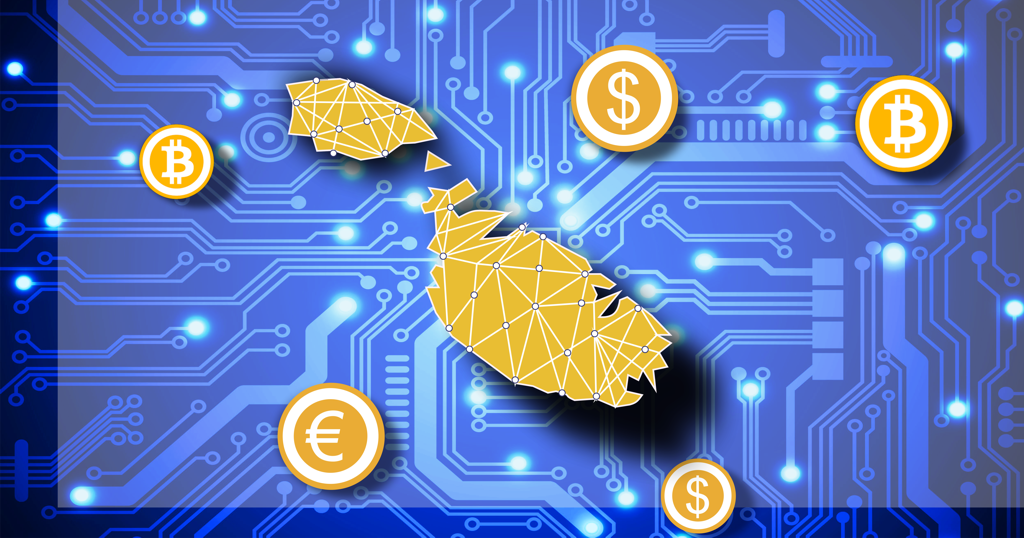
It is not the first time that Malta has swiftly turned around legislation to grant a measure of order and clarity to emerging industries, creating what could be referred as a “legal certainty market”. However, this is far from risk-free.
by Occam’s Laser
Illustration by Isles of the Left
[dropcap]I[/dropcap]n June 2018, the Maltese parliament approved three pieces of legislation intended to create a holistic framework for the governance and development of distributed ledger technology (DLT), dubbed as blockchain, in Malta. The news attracted significant interest internationally, with Forbes defining Malta as a “leading innovator in Blockchain” and Bloomberg noting that the country is taking “aggressive steps to become one of the world’s friendliest jurisdictions in the industry”.
But what is DLT? And why did Malta’s legislative actions stir so much interest?
DLT and Its Applications
A distributed ledger is a database that is shared and synchronized across networks (Investopedia). This allows counter-parties to interact with each other without necessitating intermediation by a trusted third party.
Like the internet, DLT is a foundational technology on which other applications can be built: the fields of its potential ‘disruptive’ use include trade finance, supply chain management, contracts and healthcare among others. For instance, addressing the attendees of Delta Summit on October 5, 2018, Deputy Prime Minister Chris Fearne affirmed that the use of blockchain could lead to safer and more affordable healthcare by making public health records accessible across borders and institutions.
So far though, the technology has found its most widespread application in the form of cryptocurrencies, of which the biggest is Bitcoin. The current value of all the Bitcoin in circulation exceeds one hundred billion dollars. Since Bitcoin and other cryptocurrencies operate on the basis of DLT technology, they enable users to perform direct peer-to-peer transactions without involving cash nor banks. Simply put, when A transfers money to B through traditional banking channels, the relevant banks effect the transaction by updating their ledgers to debit A’s account and credit B’s. Cryptocurrencies, on the other hand, eliminate the need for the intermediating banks, since the ledger is maintained by all members of the network in a form of distributed records—the so-called blockchain.
The Blockchain Island
While DLT and cryptocurrency have been around for a few years, most countries and regulators have taken a ‘wait and see’ approach. In a 2016 report on DLT, the European Central Bank noted that there are “a number of functional, operational, governance and legal aspects that need to be weighed carefully before considering the mass adoption of new technologies”. In this context, the actions of the Maltese government appear quite bold, since the three legislative acts approved in June signify one of the most holistic and pro-DLT/cryptocurrency frameworks in the world. Hence, the media attention.
These three acts are:
![]() the Malta Digital Innovation Authority Act, which creates the Malta Digital Innovation Authority (MDIA) as the relevant authority for the sector, in the style of the Malta Financial Services Authority (MFSA) or Malta Gaming Authority (MGA).
the Malta Digital Innovation Authority Act, which creates the Malta Digital Innovation Authority (MDIA) as the relevant authority for the sector, in the style of the Malta Financial Services Authority (MFSA) or Malta Gaming Authority (MGA).
![]() the Innovative Technology Arrangements Act, which creates a framework for the recognition of DLTs and DLT-based technologies
the Innovative Technology Arrangements Act, which creates a framework for the recognition of DLTs and DLT-based technologies
and
![]() the Virtual Financial Assets (VFA) Act. The VFA Act is perhaps the most intriguing of the three, addressing another DLT application, namely “tokens”. Tokens resemble shares or bonds: they are issued by an entity looking to raise funds for an application or project. The similarity can lead to legal ambiguity, and the VFA includes rules that are meant to address this issue.
the Virtual Financial Assets (VFA) Act. The VFA Act is perhaps the most intriguing of the three, addressing another DLT application, namely “tokens”. Tokens resemble shares or bonds: they are issued by an entity looking to raise funds for an application or project. The similarity can lead to legal ambiguity, and the VFA includes rules that are meant to address this issue.
The DLT/Crypto community received the legal framework with great enthusiasm.
Industry publication Coindesk, for example, hailed the developments by stating that “among the handful of blockchain-friendly jurisdictions around the globe, Malta stands out with perhaps the most forward-thinking regulatory agenda”. It did not take long before industry operators such as Binance, OKex, Neufund and The Abyss started moving to Malta.
What Should We Make of These Rapid Developments?
To begin with, while Malta’s actions may be bold, they also follow an increasingly familiar playbook.
It is not the first time that Malta has swiftly turned around legislation to grant a measure of order and clarity to emerging industries, creating what could be referred as a “legal certainty market”. Malta’s now ubiquitous online gambling industry is a product of this strategy. A similar strategy was employed, with varying degrees of success, in the context of hedge funds, captive insurance and even private marine security companies.
However, the ‘rebranding’ of the country as a pro-DLT/crypto hub is far from risk-free.
Prime Minister Joseph Muscat has acknowledged that the move is a “calculated risk”. But that understates the complexity of the challenge. While DLT itself is often perceived to have social advantages, the same cannot be said of cryptocurrencies, where the situation is murkier.
Some of operators moving into Malta may have been motivated at least in part by crackdowns elsewhere, which further highlights the risks involved.
One of the characteristics of the cryptocurrencies’ trading environment is a varying degrees of anonymity, which makes them vulnerable to exploitation by criminals. Europol, for example, recently noted that “money launderers have evolved to use cryptocurrencies in their operations and increasingly facilitated by new developments such as decentralized exchanges which allow exchanges without any know your currency requirements”.

A study commissioned by the European Parliament acknowledges the usefulness of DLT, but notes that the anonymity associated with cryptocurrencies is “the key issue that needs to be addressed in the fight against money laundering”. According to media reports, some of operators moving into Malta may have been motivated at least in part by crackdowns elsewhere, which further highlights the risks involved.
These issues should not be taken lightly.
There is a tremendous international pressure surrounding money laundering issues in Europe, with scandals erupting in quick succession in Latvia, Denmark (by way of Estonia), the Netherlands and, of course, Malta. Moreover, the Maltese financial sector is already subject to significant financial crime risks, due to the combined impacts of online gambling activity, international corporate structures, residence and citizenship markets—and all of that generated adverse media coverage, particularly after the assassination of journalist Daphne Caruana Galizia. These developments have provoked a response at the EU level, with a trend towards centralization of Anti Money Laundering initiatives.
The country seems to be calling for a perfect storm, with financial crime risks expanding in the face of heightened international scrutiny.
The Financial Intelligence Analysis Unit (FIAU)—the key authority in charge of combatting money laundering—in 2017 consisted only of 35 members of staff.
Local banks have already started to feel the heat, in the form of reduced access to US dollar correspondent banking (although this is also part of a broader international trend). Furthermore, there is a legitimate doubt about Malta’s institutional capacity to manage more and more financial crime risk. The Financial Intelligence Analysis Unit (FIAU)—the key authority in charge of combatting money laundering—in 2017 consisted only of 35 members of staff. Given the magnitude, sophistication and risk profile of the Maltese financial sector, the latter demands a significantly higher investment in resources.
Neither do the financial services practitioners themselves seem to be sufficiently prepared to deal with blockchain and cryptocurrency sector. It has been reported that out of 250 lawyers, accountants and auditors applying for VFA cryptocurrency agent certification, two-thirds failed the official assessment process despite last-second changes intended to boost the pass rate.
Moreover, the implications of DLT/Crypto hub initiatives go beyond the strict remit of financial crime risk. There are social and environmental consequences to consider.
The arrival of the high-tech operators to Malta will result in well-paid job opportunities. It will create business opportunities alongside with a greater pressure on the (still unregulated) property markets. The small island state will inevitably face a challenge of an increasing population density, more construction, more gridlock and, hence, disappearance of few remaining open spaces and the plummeting quality of the environment.
Unless it upgrades its infrastructure, physical and institutional, Malta risks bursting at the seams.

Occam’s Laser is a financial services professional with a keen interest in fintech, financial regulation and anti-financial crime.
Leave a Reply